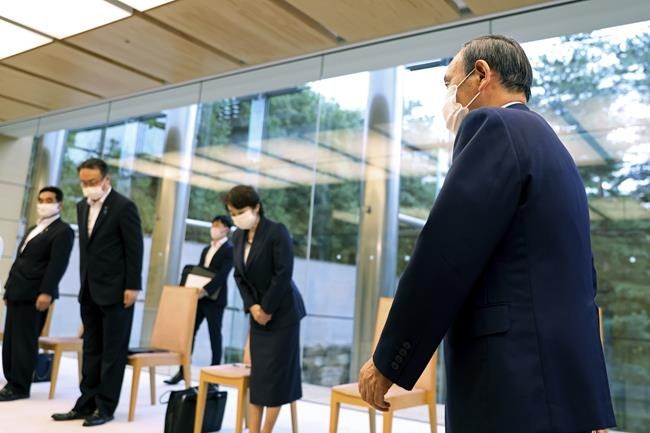TOKYO (AP) — Amid growing criticism of his handling of the pandemic, Prime Minister Yoshihide Suga said Friday he won’t run for the leadership of the governing party later this month, paving the way for a new Japanese leader after just a year in office.
Suga told reporters that leading Japan’s pandemic response and campaigning to lead his governing Liberal Democratic Party at the same time divided his energies. “I have decided not to run for the party leadership elections, as I would like to focus on coronavirus measures,” Suga told reporters who rushed to his office after the news broke.
Suga has faced criticism and nosediving public support over a coronavirus response seen as too slow and small and for holding the Olympics despite the public’s health concerns. But he said he had put all his energy into important policies including the virus response since he took office.
“But doing both takes enormous energy and I have decided that I should just choose one or the other,” he said. “As I have repeatedly told people, protecting peple’s lives and health is my responsibility as prime minister, and that’s what I will dedicate myself to.”
LDP has the majority in Parliament, meaning the new prime minister likely will be whoever wins the Sept. 29 party vote.
The official start of the campaign is Sept. 17 and a few potential candidates have said they intend to run. Candidacy requires factional support largely controlled by party heavyweights and their choices may not match those favored in public opinion surveys.
Two potential candidates are former Cabinet ministers in Shinzo Abe's government: dovish former Foreign Minister Fumio Kishida, and former Interior Minister Sanae Takaichi, who shares the ultra-rightwing ideologies of Abe. Others mentioned in media include Vaccinations Minister Taro Kono and Environment Minister Shinjiro Koizumi.
Kishida recently proposed a series of virus measures, including more funding, a pledge to secure more hospital beds and to create a health crisis management agency to centralize pandemic measures.
Suga's decision is largely seen as a political move so the LDP can have a fresh leader before national elections later this year. The lower house term ends in late October and elections for the new Parliament must be held by late November.
Suga took office in mid-September a year ago after Abe resigned due to health problems, to fill in the rest of his three-year term.
The son of a strawberry farmer from Japan's northern prefecture of Akita, Suga enjoyed support ratings as high as 70% early in his tenure because he was a leader from the common people rather than blue-blood political families like Abe.
Suga introduced a series of pragmatic measures including digital transformation and administrative reforms, but his support ratings slid quickly over his virus measures seen as too slow and too small to prevent growing outbreaks.
Suga's downfall started late last year when he bumbled a travel promotion campaign as the pandemic was worsening. He was forced into declaring a state of emergency in January and has since repeatedly expanded and extended the emergency measures, most recently until Sept. 12. In the latest media surveys, support ratings have declined to around 26%.
The emergency has largely focused on requests for eateries to close early and not serve alcohol, while requests for people to stay home and social distance have largely been ignored.
Suga has been criticized for presenting an overly optimistic outlook on the pandemic and for not sending convincing messages to the people to have the sense of crisis. The vaccine-reliant policy also exposed people to risks while the vaccination campaign rollout was slow to get started.
Although the pace of new cases in Tokyo has somewhat slowed, experts say a resurgence can happen any time and the health care systems is under severe pressure with hospitals filled with serious patients and tens of thousands of sick people recovering at home.
Mari Yamaguchi, The Associated Press




